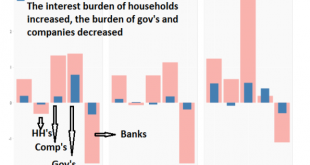from Peter Radford Already the Trump regime is taking shape. Or, rather, I ought say the agenda is taking shape since the cabinet that is supposed to be overseeing things is well behind schedule in arriving on station. First things first. Trump raised to cost of applying for a mortgage for low income people. He undid a recent reduction in the fees charged by the FHA. That reduction had been put in place because the FHA has a large surplus and wanted to pass along that prosperity to...
Read More »A case for low Eurozone interest rates
As far as I’m concerned, the ECB does not yet have to increase interest rates – as households still have to be able to refinance many billions high rate loans. As mister Draghi has shown, using sectoral balances, households have, unlike companies and governments not yet profited from low rates and QE! Individual EU countries have to reign in the housing market, though. Below, I’ll share some thoughts about this (as I’m a member of the ECB shadow council who gives advice on this, and I am...
Read More »College and the American Dream (3 charts)
from David Ruccio The American Dream has all but collapsed under the weight of growing inequality. It’s becoming increasingly difficult for the American working-class to sustain a decent standard of living, and their children are increasingly unlikely to be better off than they are. But those who hang on to the American Dream—or at least the selling of that dream to others—believe that sending young people to the nation’s colleges and universities is the solution. The problem, of...
Read More »Are negative interest rates dangerous? A debate between Thomas Palley and Adam Posen
Thomas Palley A negative interest rate policy (NIRP) appears revolutionary, but its justification rests on failed, pre-Keynesian “classical” economics. This claims that lower interest rates can always solve aggregate demand shortages and lead to full employment. Keynes discredited classical economics by showing that saving and investment might not respond, as assumed, to lower interest rates. Once all profitable investment opportunities have been undertaken, negative interest rates may...
Read More »The Group of Thirty might finally end its scandalous existence
from Norbert Häring The European Ombudswoman has announced that she will investigate the membership of the President of the European Central Bank (ECB), Mario Draghi, in the Group of Thirty. this is a shadowy forum of the most senior executives from large commercial banks and the most important central banks.The Group of Thirty meets behind closed doors without the press and without minutes taken. Some of the institutions are being supervised by the ECB. This group could come to an end,...
Read More »Current concerns about the zero bound on interest rates
from Maria Alejandra Madi Much of the comments on the global financial and economic crisis have focused on the proximate causes and governance issues related to risk management, monetary policy and weak regulation. New political alignments allowed a process of global financial deregulations in the early 1970s. The political ascendancy of financial capital and extensive capital market liberalization, employment goals were abandoned in the economic policy agenda. Indeed, price...
Read More »Economics as science and ideology
from Peter Söderbaum Book review of Offer, Avner and Gabriel Söderberg, The Nobel Factor: The Prize in Economics, Social Democracy and the Market Turn, Princeton University Press, Princeton 2016. Since 1969 there has been a so called Nobel Economics Prize. It is not a normal Nobel Prize established by Alfred Nobel but rather a prize reminding us of the 300 year existence of the Central Bank in Sweden. The correct name is “The Bank of Sweden Prize in Economic Sciences in Memory of Alfred...
Read More »Healthcare Chaos
from Peter Radford Here we are one day before the ascension of Trump to the White House and already the policy chaos has begun. To be fair to Trump this particular chaos is not necessarily of his own doing entirely. The Republicans in Congress are also responsible. So hell bent are they in expunging all things Obama from the record that they have charged into the valley of death known as health care reform. Or, in this case, un-reform. Having spent vast amounts of hours and taxpayer money...
Read More »Uncovering where the econometric skeletons are buried
from Lars Syll A rigorous application of econometric methods in economics presupposes that the phenomena of our real world economies are ruled by stable causal relations between variables. Parameter-values estimated in specific spatio-temporal contexts are presupposed to be exportable to totally different contexts. To warrant this assumption one, however, has to convincingly establish that the targeted acting causes are stable and invariant so that they maintain their parametric status...
Read More »Theory of Employment
from Asad Zaman This is the 9th Post in a sequence about Re-Reading Keynes. In chapter 2 of General Theory, Keynes wishes to develop a theory of employment. He claims that classical economics does not have a theory of employment, because it assumes that all resources will be fully employed. But the theory that unemployment will always be 0% – except for frictional – is not a theory which can explain observations of high and persistent unemployment. Taking this post-Depression observation...
Read More » Real-World Economics Review
Real-World Economics Review



